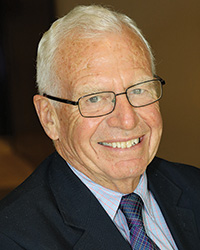
Kirk & Co.
The new Fed chair Jerome Powell announced the first rate hike for 2018 on March 21. Along with continuing members of the Federal Open Market Committee (FOMC), Powell represents continuity and consistency, accessibility and transparency. Messages about the current context of the markets and economy and the Fed outlook, short and long, are in familiar terms and thorough. However, securities market volatility from newly implemented tariffs and other unintended consequences of the unprecedented Fed monetary action matters continue to rattle investors. And ripple through other asset markets including commercial real estate. Outlook as reported by the Fed continues to be positive resulting in assertions that two more hikes in rates are likely during 2018.
The Fed raised federal funds rate by 25 basis points to a range of 1.50%-1.75%, and the Fed released FOMC updated March 2018 economic projections. These projections were generally and marginally more optimistic than December 2017 FOMC projections. Briefly and risking misleading data out of context, these projections included: median 2018 GDP forecast 2.7% up from 2.5%; median 2019 GDP forecast 2.4% up from 2.1%; median 2020 forecast 2.0% no change from December 2017 forecast. Federal funds rate for longer run is projected for 2.875% up from 2.750% in December 2017; for 2018 - 2.125%, no change; for 2019 - 2.875% up from 2.688%; for 2020, 3.375% up from 3.063%. These projections are (some combination of) estimates by individual Federal Reserve Board members and Federal Reserve Bank presidents. Fed communications have referenced tax reform and currency and trade and deficits. The forecasted context and measures of this activity are certainly included (somewhere).
The Fed still plans at least three rate hikes during 2018, now two more, and further deleveraging of the balance sheet. Both actions to normalize the market will continue to put upward pressure on rates, destabilize and quantitatively tighten the capital markets. Domestic capital markets have anticipated upward movement. Global capital inflows are more difficult to forecast with the broad improvements in the global economy. And currency, particularly dollar fluctuations, and trade, particularly with new tariffs, and hostile conflicts, are already broadly active and complex. Preparing to thwart sudden recessionary pressures, the Fed has repeatedly stated that rate increases and deleveraging are essential to ongoing efforts to sustain economic growth and full employment.
Buoyancy is prevailing. Whether another cycle of building could occur is highly speculative. However, short term plays including adaptive reuse, repositioning, value add all have some running room and activity. And build-to-suits, multifamily housing of all kinds, industrial, healthcare, well researched experience/entertainment retail are substantially preleased and presold. Sometimes, somewhere.
With a good plan and good sponsorship, many projects can be underwritten with rebalancing of debt ratios and capital stack. Commercial real estate continues to benefit from moderate economic fundamentals and well-priced risk. Unlike frequent daily records set in the domestic securities market and rising indexes in global markets, commercial real estate pricing is generally stable. Nevertheless, the favorable conditions and outlook are unevenly spread over related capital and property markets. Because of political stability and prosperity and stable fundamentals and broad, liquid property markets, the US commercial property market is a competitive investment alternative.
The Fed does report the economic data that is guiding and supporting FOMC decisions regarding monetary policy. And the Fed does provide the detail of the Fed outlook. For these reasons, the Fed is a particularly reliable resource for market context and economic outlook, even without much on commercial real estate.
Optimism favors commercial real estate.
David Kirk, CRE, MAI, FRICS, is principal and founder of Kirk & Company, Real Estate Counselors, Boston.








